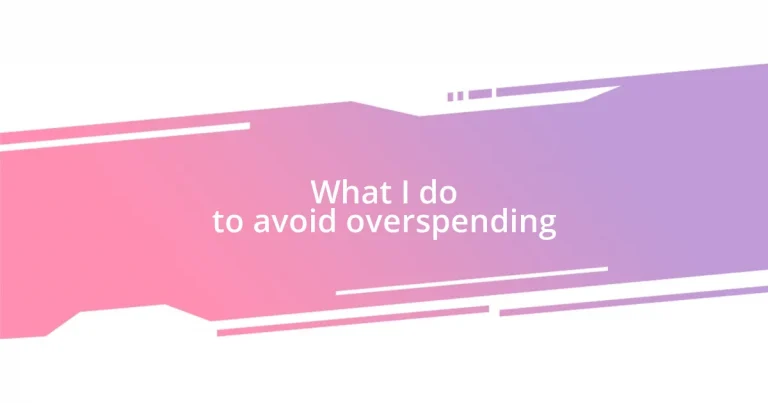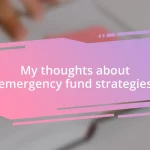Key takeaways:
- Understanding emotional triggers and tracking daily expenses can significantly improve spending habits and encourage mindful decision-making.
- Implementing budgeting tools, like the envelope system and setting alerts, helps maintain financial discipline and prevents overspending.
- Regularly reviewing and adjusting the budget enables better alignment with personal values and financial goals, fostering a proactive approach to financial management.
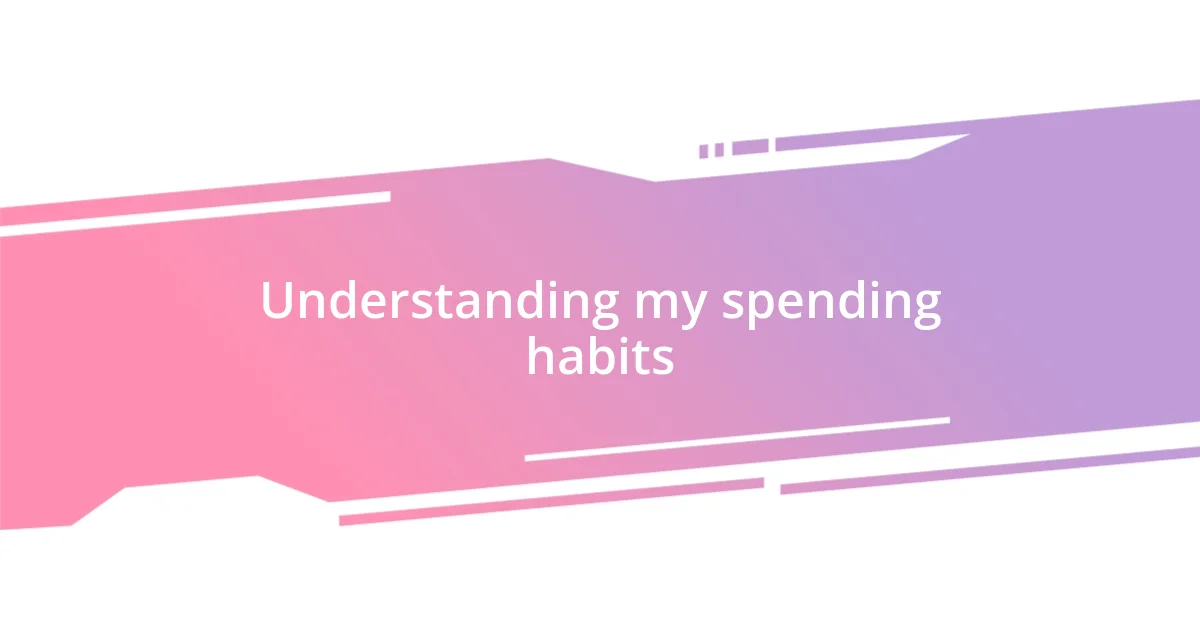
Understanding my spending habits
Understanding my spending habits has been quite a journey of self-discovery. I realized that certain emotional triggers, like stress or sadness, often drive me to splurge on things I don’t really need. Have you ever found yourself scrolling online and justifying a purchase because you were feeling down? I know I have.
In my experience, budgeting has unveiled patterns in my spending behavior that I initially struggled to recognize. For instance, I used to think that a morning coffee was a harmless little treat—just a few bucks here and there—until I tracked my spending and realized it added up to a small fortune over a month. It was a wake-up call to consider not just what I buy, but why I feel compelled to make those purchases.
I’ve learned that awareness is key in mastering my financial habits. Sometimes, I reflect on my impulse buys and find myself asking, “Was that really worth it?” Often, the answer is a quiet no, which encourages me to think twice before my next purchase. How about you—do you often pause and reflect on your purchases, or do you find it challenging to connect those emotions to your spending?
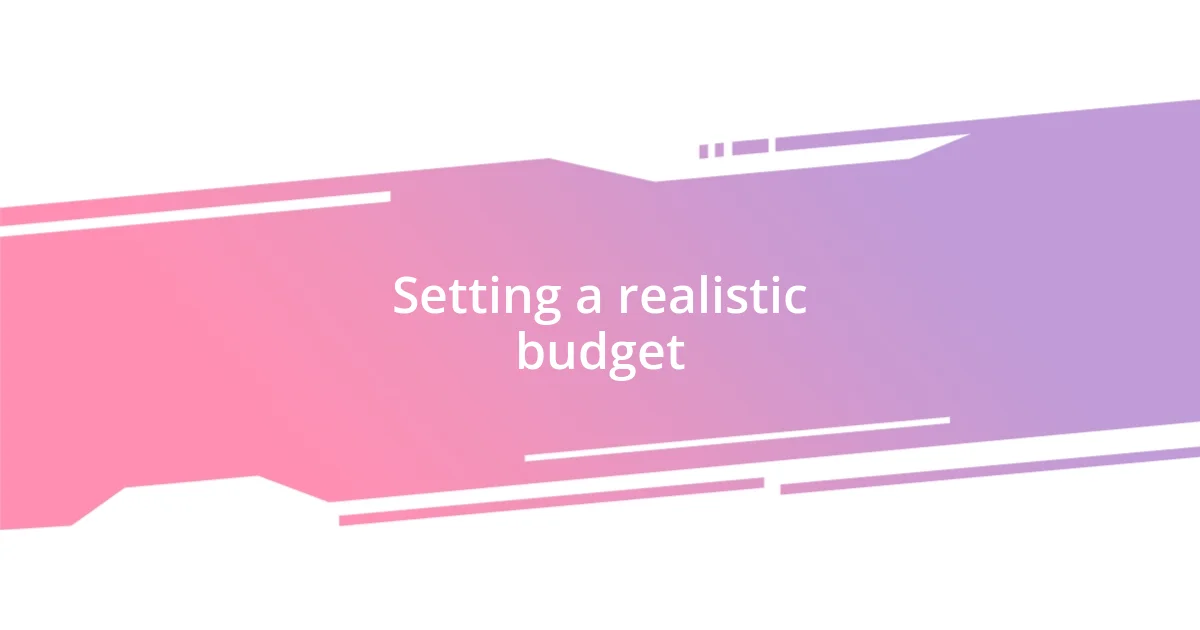
Setting a realistic budget
Setting up a realistic budget isn’t just about numbers; it’s really about understanding myself and what I truly value. There was a time when I used to underestimate the importance of creating a detailed budget. My early attempts were superficial, focusing only on fixed expenses without considering those sneaky variable costs that seemed minor but piled up significantly. Now, I’ve learned that breaking it down into categories makes a huge difference.
Here are a few steps I’ve taken to create a more realistic budget:
- Track your expenses: I started with a simple app on my phone to monitor every dollar. It was eye-opening to see where my money was really going.
- Set realistic limits: Instead of slashing my coffee budget completely, I decided to allocate a smaller, manageable amount. This way, I still enjoy my treat without overindulging.
- Include savings: I treat my savings like a bill that must be paid every month. It’s helped me prioritize and grow my financial cushion.
- Revisit and adjust: Life changes, and so should your budget. I now review mine monthly to reflect any new priorities or expenses.
Through these efforts, I’ve been able to strike a balance between enjoying life and maintaining financial discipline, which has been incredibly rewarding!
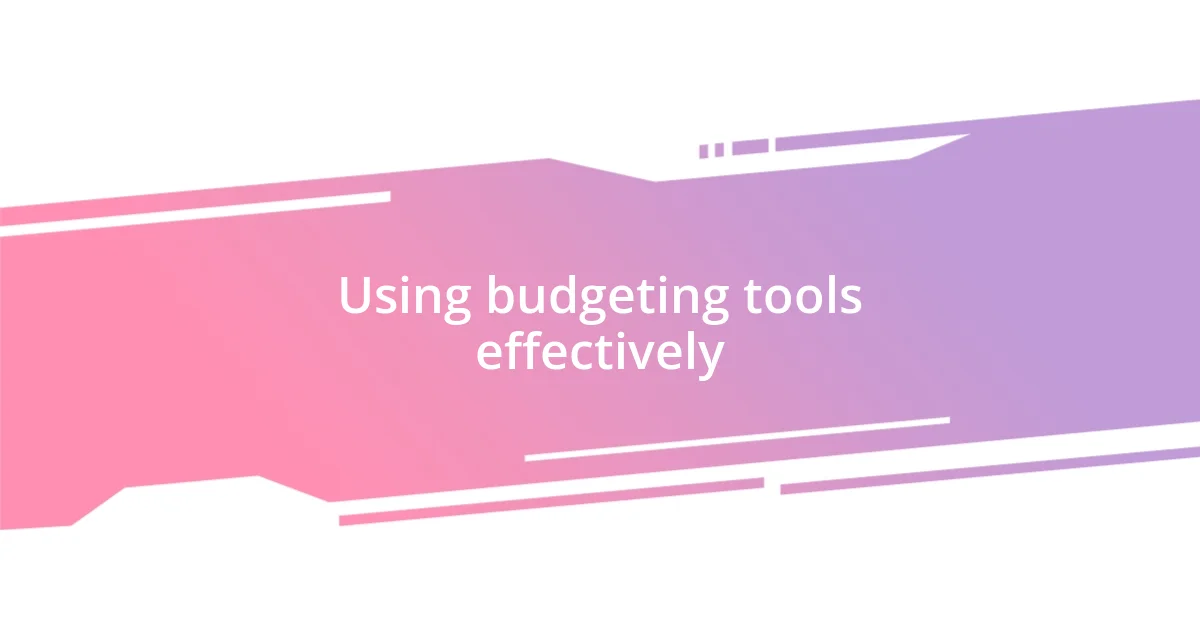
Using budgeting tools effectively
Using budgeting tools effectively can truly transform how I manage my finances. I’ve experimented with various budgeting apps and software, and what stands out to me is how different tools cater to my unique needs. For instance, I found that a zero-sum budgeting app worked wonders for me when I wanted a sense of control over every dollar. It gave me clarity on my spending and ensured that my income was effectively allocated to expenses, savings, and even fun activities. Have you ever tried a tool that made tracking your expenses enjoyable? It can be a game changer.
Another important aspect has been setting alerts within the tools I use. By customizing notifications for bill due dates or spending limits, I’ve developed a helpful early-warning system. There were moments when I would forget that my subscription renewals were just around the corner, and it hit me like a surprise bill in the mail. With alerts now set up, I’ve seen my overspending drop dramatically—no more unanticipated expenses sneaking up on me!
Finally, I often combine different tools to get the best of both worlds. For example, I enjoy using a detailed spreadsheet to plan my monthly expenses but also check an app for real-time spending updates. This dual approach not only keeps me organized, but it gives me peace of mind knowing I’m on top of my financial game. Have you ever considered mixing and matching budgeting methods to align with your lifestyle? It can lead to remarkable improvements in how you approach your finances.
| Tool Type | Features |
|---|---|
| App | User-friendly interface, expense tracking, spending alerts |
| Spreadsheet | Customizable budgets, comprehensive expense analysis, debt tracking |
| Envelope System | Physical cash management, spending limit adherence, visual awareness |
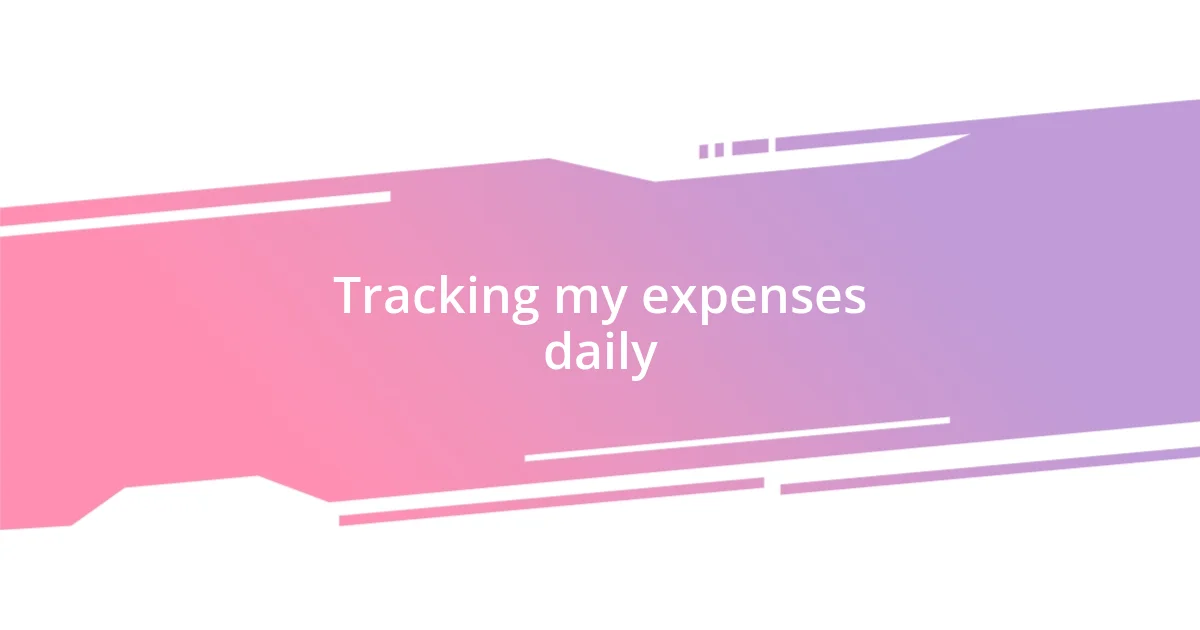
Tracking my expenses daily
Tracking my expenses daily has become a pivotal part of my financial routine. Initially, it felt cumbersome, almost like a chore, but over time, I’ve discovered its significant impact on my spending habits. When I first started, I was surprised by how many little purchases added up. Like that lunch I thought was just a treat—it turned out to be a daily splurge that was quietly draining my budget.
As I diligently logged my monthly expenditures, I encountered moments of revelation. I remember when I realized that my impulse buys often stemmed from boredom rather than a genuine need. By documenting each transaction, I became more aware of my triggers. It has also reinforced the idea that every dollar spent is a decision—one I need to consciously make. You ever found yourself questioning a purchase after realizing how often it appears in your tracking? It’s a little humbling, isn’t it?
Now, I’ve established a habit of checking my expenses at the end of each day. It’s almost like a ritual for me. By reviewing my transactions, I not only feel a sense of accomplishment but also gain clarity for the next day. I can visualize where I stand financially, making adjustments if needed. Have you ever noticed how this simple practice can empower your financial decisions? It’s taught me to cherish the choices I make with my money rather than let them slip away unnoticed.
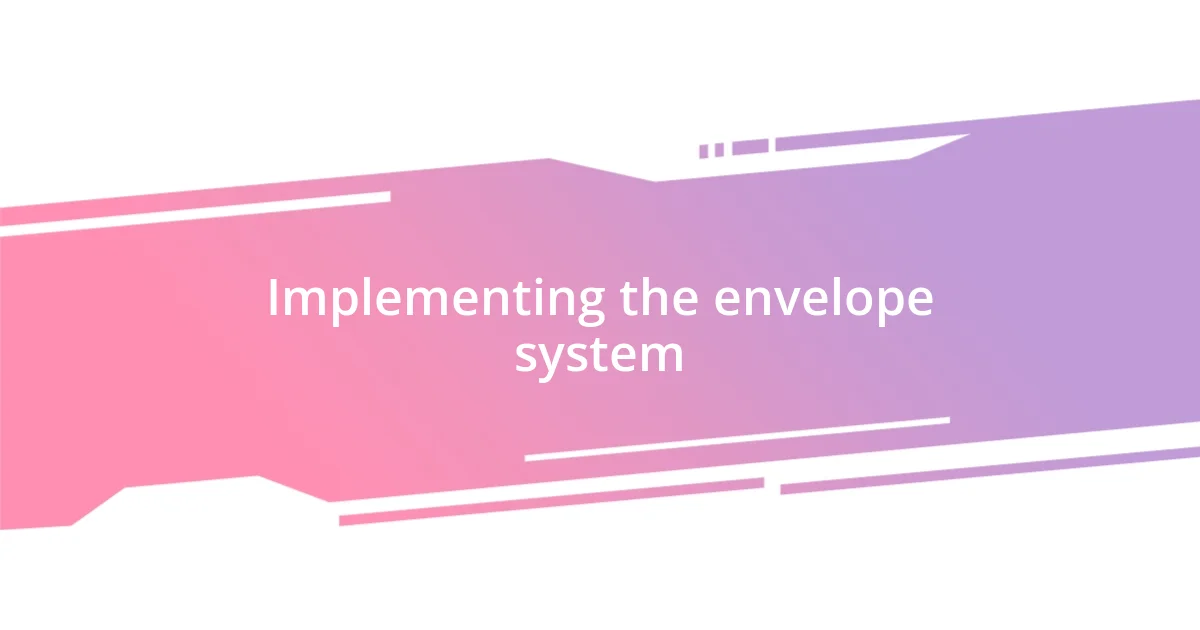
Implementing the envelope system
Implementing the envelope system has been a game changer for me. I remember the first time I put cash into physical envelopes, each labeled for a specific category like groceries, entertainment, and dining out. It felt oddly empowering to see the money allocated for each purpose. There’s something visceral about handling cash that makes the spending feel more tangible and intentional. Have you ever felt that connection with money?
Over time, I noticed how this method nudged me toward better financial choices. Once, I had to decide between a fancy dinner out and a concert ticket—a choice I could feel weighing on me. Instead of just swiping my card, I looked at my dining envelope and saw the limited cash available. It quickly became clear that I’d have to forgo the dinner to enjoy the concert. This visual deterrent kept me from overspending and reinforced my commitment to my budget. Have you had a moment where a budgeting tool completely shifted your perspective?
What I appreciate most is how the envelope system fosters mindfulness. By physically counting the cash at month’s end, I reflect on my spending habits. That cash zeroing out in some envelopes was a small but powerful reminder of my priorities. I realized that avoiding overspending isn’t just about sticking to a budget—it’s about aligning my spending with my values. How often do we pause to consider whether our purchases reflect our true priorities? I know this practice has prompted me to think twice before indulging in unnecessary expenses.
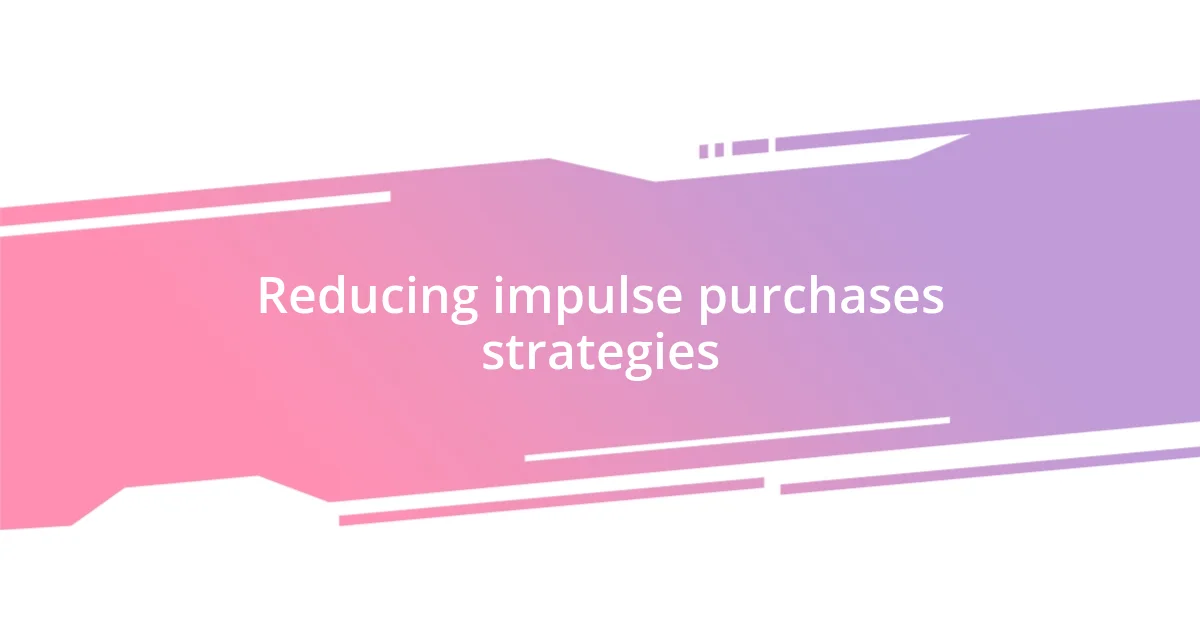
Reducing impulse purchases strategies

Creating a 30-day rule before purchases
One strategy that really resonates with me is the 30-day rule. Whenever I feel the urge to buy something non-essential, I put it on hold for a whole month. I can’t tell you how many times I’ve walked away from a purchase after letting it marinate in my mind for that long. Sometimes, a passion for a trendy gadget fades, and I realize it’s not as enticing after all. Have you ever stopped to think about how quickly those new thrills can lose their luster?
This pause isn’t just about delaying gratification; it’s about discerning between wants and needs. I remember once eyeing a pricey pair of shoes. After 30 days, my excitement had settled, and what I thought was a must-have transformed into a fleeting whim. The money I saved absolutely felt like a mini victory. It illustrates how taking an intentional step back can change your perspective on spending. How often do we leap into purchases without truly analyzing our motivations?
Looking back, I realize that this small adjustment has brought clarity to my shopping habits. It’s less about deprivation and more about empowerment. By revisiting my desires after a month, I’ve developed a sense of ownership over my spending decisions. There’s something incredibly freeing about knowing that I control my finances, rather than them controlling me. Have you ever thought about how much more informed your choices could be with just a little patience?
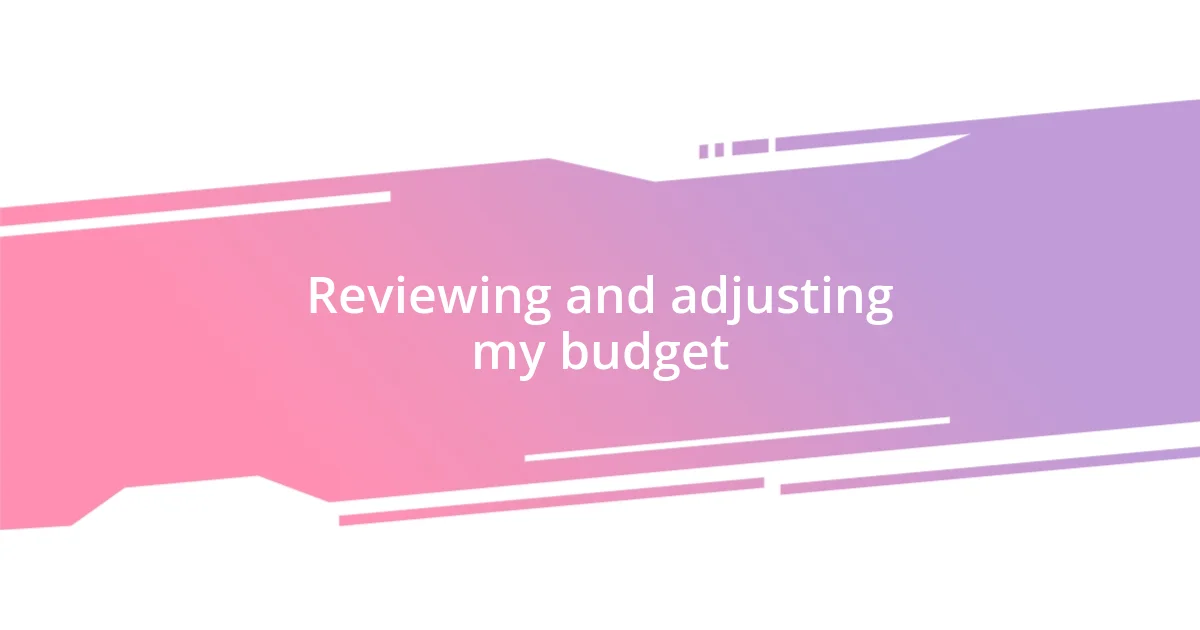
Creating a budget and sticking to it
Creating a clear budget is like drawing a roadmap for my spending journey. Each month, I sit down and outline my income and expenses, setting specific limits for each category. What really struck me was how empowering it felt to see my financial path laid out before me like a game plan. Have you ever felt that rush of control when you know exactly where your money is going?
I’ve also learned to review my budget weekly, which is essential for staying accountable. One time, I noticed I was getting close to blowing my dining out budget by the second week. I realized that those last-minute dinners were adding up, and it forced me to reassess my plans. Instead, I invited friends over for a potluck, creating memories without derailing my budget. It’s amazing how a little proactive decision-making can lead to significant savings. Can you recall a moment when adjusting your plans saved you from overspending?
Most importantly, sticking to my budget has nurtured a sense of discipline that I’ve come to cherish. With every successful month, I feel more confident and in control. I remember how daunting it used to seem, but now, it’s a rewarding challenge. Knowing I’m aligning my spending with my goals is genuinely fulfilling. How has your relationship with budgeting transformed over time? I find that it’s not just about restrictions, but about enriching my life with purposeful choices.

Reviewing and adjusting my budget
Reflecting on my budget regularly has become a cornerstone of my financial well-being. Each month, I dedicate time to sit down with my previous expenses, assessing what worked and what didn’t. Just last month, I discovered I had overshot my entertainment budget significantly due to spontaneous movie outings. It was a wake-up call—I realized I hadn’t factored in that my current lifestyle included more movie nights than I had anticipated. Has there ever been a moment when re-evaluating your choices shifted your perspective?
Adjusting my budget is not just a chore; it feels like a reset button that helps me recalibrate my priorities. For instance, when I noticed my grocery spending creeping higher, I adapted by planning my meals in advance. That small change led to both healthier eating and significant savings. It’s incredible how a simple tweak can lead to greater control over my finances. Have you experienced that rush of satisfaction when your budgeting strategy starts to pay off?
Ultimately, nothing beats the feeling of mastery that unfolds from this process. Whenever I fine-tune my budget, I feel more equipped to tackle unexpected expenses, like car repairs or medical bills. This proactive mindset has transformed my approach to financial challenges. Instead of fearing the unknown, I welcome it, knowing I have a robust budget that can withstand surprises. How does taking charge of your finances make you feel? Personally, I’ve found it liberating to know that I’m actively shaping my financial destiny.












